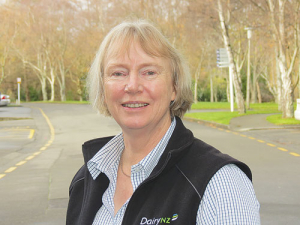Early results from a Massey University study show animal vaccinations are effective in preventing leptospirosis shedding in NZ dairy cattle, reducing exposure to humans.
But the results also reinforce the importance of using other prevention measures, explains DairyNZ veterinarian Nita Harding.
Massey University last year investigated the use and effectiveness of lepto vaccines in New Zealand dairy herds, testing 20 cows in each of 200 herds across the country.
In 147 herds none of the cows tested were shedding lepto in their urine; in the remaining 53 herds at least one cow tested was shedding; and in 10 herds between two and six cows were shedding.
Which strains are causing problems?
Cattle can be infected by up to six lepto strains, but the two most common in NZ are Hardjobovis and Pomona. These strains are included in the vaccines used for controlling lepto in dairy herds. Neither strain was significantly associated with shedding, which tells us vaccination against these strains is working.
Two strains of lepto that aren’t included in the vaccines are Ballum and Tarassovi. And you guessed it, evidence of these strains was found in the cows tested (3.4% and 17.1% respectively.)
We know Ballum is not associated with urine shedding but Tarassovi is. That indicates an increasing number of lepto cases in people working on dairy farms are probably due to the Tarassovi strain.
Tarassovi isn’t covered by the current vaccines because it wasn’t a common problem when the vaccines were first developed at least 30 years ago. Pharmaceutical companies are looking at developing a vaccine for Tarassovi, but this will take some years.
The study results are now being further analysed. In the meantime, we can confirm that vaccination does prevent cattle shedding the strains of lepto included in the vaccines. But minimising risk to human health also requires other precautions (see below) which are especially important in light of Tarassovi’s growing prevalence.
Recommended precautions for dairy farmers
1. Vaccinate your animals: seek vet advice to ensure the timing of vaccination is correct for each class of stock.
2. Control rodents and wildlife: seek advice on baiting and trapping, and vermin-proofing buildings and feed stores.
3. Minimise contact with animal urine through:
- personal hygiene – hand washing, no smoking/eating/drinking in the shed
- personal protective equipment (PPE) – aprons, gloves, boots
- keeping wounds covered
- being aware of other risk activities onfarm, such as effluent spraying, assisting with calving, home-killing and hunting.
4. Be aware: remember that people can be exposed to lepto onfarm even when they’re not working, e.g. kids playing in puddles.
5. If you have flu-like symptoms, seek medical help early and mention lepto to your doctor.
Note: research has shown that shortening tails does not reduce the transmission of lepto, so it is recommended that all farmers follow these precautions above.
This research was overseen by the Farmer Leptospirosis Action Group (FLAG), which includes representatives from DairyNZ, Massey University, the NZ Veterinary Association and Rural Women NZ. Funding was provided by the Government and AgMardt, industry and stakeholder groups.
• This article was originally published in Inside Dairy August 2017.

















